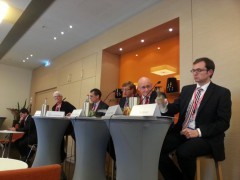GES Day 1: It’s Sustainability Stupid!

After many months of writing about the New Bottom Billion I have finally arrived at the Global Economic Symposium 2013 (GES). As I walked out of Kiel’s main station I realized that the GES’s theme of ‘Redefining Success’ is well suited to my new surroundings. Global challenges are going to be discussed with the air filled with sun, sea mist and accordion music from a local street musician. It feels more like a vacation really. But rather than taking time out for leisure, all GES participants – head of states, Nobel Peace laureates, CEOs, academics, economists and more – are actively attempting to find solutions to global problems.
What do you mean by Global Public Goods? Interview with Dr. Inge Kaul at the Global Economic Symposium.
Although tomorrow I will return to writing on my original topic of development policies for the global poor, today I have zoomed in on inclusive and sustainable growth. My GES colleague Dragos Costache’s summary of the opening session on how we define success, made me wonder how I define success. And very quickly I realized that like many other people I get trapped in three narratives as the President of Kiel Institute of the World Economy and the GES Dennis Snower said. And out of three narratives on global risks, happiness and materialistic progress I fall very easily into the materialistic narrative, which places sustainability in the economic and environmental sense at the very bottom of its agenda. Given that far too many people in the global North subscribe to this narrative, and that people in the global South will most likely repeat our mistakes, it is easy to realize that we have long ago entered a tragedy where ‘we plunder our planet to produce material goods from which we expect great pleasures that fail to materialize’ (Dennis Snower). Amen.
So how do we make a sustainability a part of our daily lives and routines? The session ‘Assessment and Implementing Sustainable Governance’ tried to answer this although speakers concentrated more on the global than the local level. At some point the number of issues that need to be decided by traditional governments has grown too complex and too transnational to be decided by a single government. Consensus on the international level is too difficult and takes way too much time, but it is still the only way. But part of the reason why it is is so difficult to reach a consensus lies in what a panel member said – ‘we all have different definitions of governance’. But then again, wouldn’t the world be a monotonous place if we all thought the same?

‘Assessment and Implementing Sustainable Governance’ panel. From left Dr. Inge Kaul, Marijn Verhoeven, Peter Woodward, Anthony Hodge and Jan Rielaender. Photo by the author.
What struck me was that it was Anthony Hodge, President of International Council on Mining and Metals, who said what was really on my mind: We need to ‘create governance with a heart’. In rooms awash with high level politicians, academics and business leaders there are few or no representatives of the very local level where sustainable governance is implemented and really needed. Where are the world’s poor, the middle classes in the emerging economies, the unemployed, citizens and migrants touched by global public goods? Unfortunately they were not in the room today. True global solutions are found outside board rooms and international conferences, so why not open ourselves up to them?
Even so, I still have hope as organization of our ideas for roll-out will happen tomorrow at the Ideas Fair. As such tomorrow is another new day to find sustainable solutions to the global challenges. I’m looking forward for it.
Tags: ges2013, Governance, kiel, sustainability, sustainable governance
